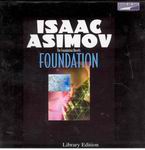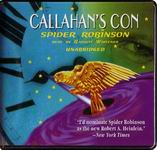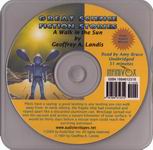
 Foundation
Foundation
By Isaac Asimov; Read by Scott Brick
7 CD’s, 9 hours [UNABRIDGED]
Publisher: Books on Tape
Published: 2005 (Re-issued with new narrator)
ISBN: 1415917760
Themes: / Science Fiction / Psychohistory / Galactic Empire / Energy / Science /
I could write this review in one sentence: A first-rate science fiction classic performed by a top-notch narrator. Whew! I’m exhausted. I better relax with another audiobook…
But first, a few more comments. Foundation is one of Isaac Asimov’s earliest works. One of the joys of reading this novel is recognizing it as an influence on so many other works in science fiction. Since Foundation was published, countless empires have risen and fallen in the pages of science fiction novels and on flickering movie screens. Most obviously, the latest Star Wars movie includes a visit to Coruscant, a planet that is one huge city, just like Asimov’s Trantor.
Like I, Robot, another of Asimov’s best known books, this is not a novel, but a collection of stories. The first (Book 1) is called “The Psychohistorians”, which follows Gaal Dornick as he visits the planet Trantor for the first time. Trantor is a planet completely covered in city – it serves as the capital of the Galactic Empire. Dornick visits Hari Seldon, who is under persecution for predicting the fall of the empire using psychohistory, a mathematical method for predicting probable futures for large numbers of people. The story concludes with the establishment of the Foundation, where a group of scientists will be charged with collecting all human knowledge into a great Encyclopedia.
Book Two is “The Encyclopedists”. It is 30 years after the first story, and it is here that the reader first encounters Salvor Hardin, a political rival of the mayor of Terminus, the name of the planet where the Foundation resides. The story is of a political struggle between two factions, with Hardin winning the day in grand fashion as a holographic Hari Seldon makes his first appearance to tell folks what’s really going on here.
Book Three, “The Mayors”, again stars Salvor Hardin, much later in his career. He is now being challenged as he challenged others in the previous story. Hardin has discovered that the only thing he’s got that surrounding systems don’t have is knowledge of atomics (a knowledge that has been lost at the edge of the empire). So, to keep from being attacked, he creates a sort of religion out of atomic science, trains “priests” to deal with it, and sends these priests out to threatening worlds to keep them at bay. Works great, but now there’s a challenge.
“The Traders” is Book 4, again taking place years after the previous story. Hardin is long gone, and the Foundation now is home to a sub-class called Traders, who are largely independent, but still loyal to the Foundation…
…who evolve into “The Merchant Princes”, the subject of Book 5, the longest installment. The traders have grown rich, and there’s a serious threat to the Foundation. Questions about the further validity of the “religion” are questioned, toss in some espionage, and the struggle is on.
Scott Brick does an amazing job with Asimov’s work. This first book was published in 1951, so Brick has to say things like “Great leaping galaxies!” while keeping a straight face. Apart from these occasional exclamations, the book works extremely well here in 2005. Asimov deserves his place amongst the Grand Masters of the genre, and Scott Brick’s performance adds a worthy dimension to the classic. I’m very much looking forward to hearing the rest of the trilogy.
Posted by Scott D. Danielson

 State Of Fear
State Of Fear


